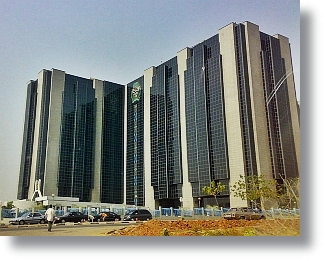External Debt: Nigeria Must Exercise Restraint

 |
| Central Bank of Nigeria Photo courtesy |
Debt: Before and after
In 2006, Nigeria became the first country to have a majority of its debt forgiven. That move left the country with only $3.5 billion in foreign debt. High oil prices allowed the country to save money in an excess crude account which continues to be used to finance projects.
At the end of 2009, Nigeria's debt portfolio registered at $3.9 billion. That debt included $1.85 billion accrued by state governments including Lagos, Cross Rivers and Nasarawa states. Yet, it was an extreme surprise to read that not only was Nigeria repaying loans from the 1960s but that the country's foreign debt hit $29 billion in June 2010 only six months after it registered at $3.9 billion.
How did we get here?
Unfortunately, some of the loans in Nigeria's debt portfolio stem from loans from as far back as the 1960s. However, late president Yar'adua also accepted $3 billion from the World Bank in 2008. And there were other loan agreements entered into by his administration which included current President Jonathan who was vice president at the time.
Although the House of Representatives rejected an attempt by the federal government to take a $300 million loan from the World Bank in December 2009, the country has taken more loans from the international institution. Since Yar'adua's death, Jonathan took a World Bank loan to the tune of $915 million and the details of this particular loan are absolutely egregious. For instance, the loan requires the government to take another $200 million loan. That loan for HIV education, must take place in Washington, DC of all places and the air travel tickets must be purchased from British airways which has repeatedly shown its contempt for its Nigerian passengers. These terms illustrate the irresponsibility of the Jonathan administration and the legislative body which voted in favor of the loan. And of course, the irresponsibility of institutions like the World Bank is without question as a loan such as the $915 million appears predatory in the manner of the very loans that brought the American and global economy to it's knees.
What is particularly worrisome is the lack of transparency as to what loan agreements Nigeria has entered into under either the Yar'adua or Jonathan administrations. Furthermore, the lack of verifiable projects on the ground that reflect the additional debt, make this jump in debt a significant concern. Where has the money gone? What progress has been made on the projects for which these monies were borrowed? It is these issues that transform the increase in debt from being a typical response to current economic realities to something more sinister. Plus, Nigeria's history of corrupt government officials cannot be ignored given that the country has lost a conservative estimate of $89.5 billion to graft 1970. And, there remains the embarrassing possibility that the country may not even know exactly how much it owes because it is forced to rely on documents from foreign lending institutions.
But despite all those challenges, the most important issue is that Nigeria’s foreign debt will remain a burden for the country's youth, who, as of now, cannot attest to the benefits of such financial arrangements. This attitude is buttressed by the slow pace of development in many parts of the country. Yet, they will be saddled with the repayment requirements long after the generation that took the loans is gone. Nigeria must spend, but must spend efficiently and do so with an eye towards long lasting benefits for the majority of it's citizens. As of yet, there is little indication that such is taking place even as the national debt portfolio jumps at dangerous rates. Nevertheless, this debt increase can eventually be reconciled with a concrete commitment to produce on many of the announced development plans that require completion such as improvements to the electricity sector. And until that day comes, the jury will be out on Nigeria’s leadership and the wanton path to great debt they appear to be traversing on.
By Solomon Sydelle,
Nigerian Curiosity
